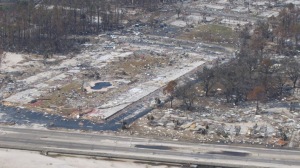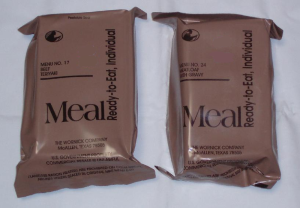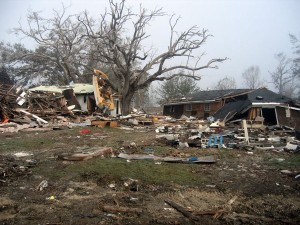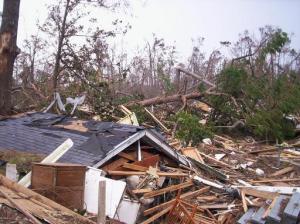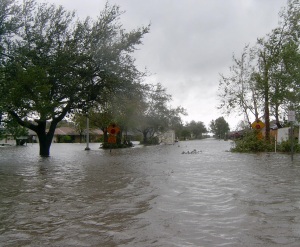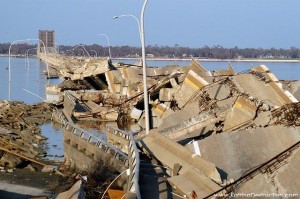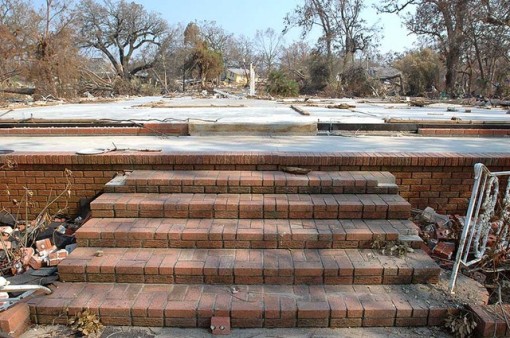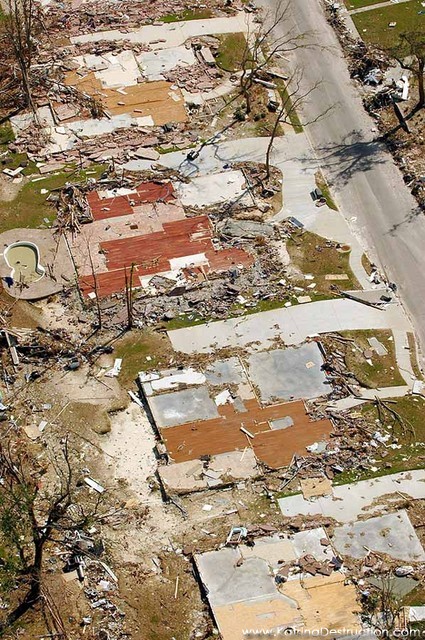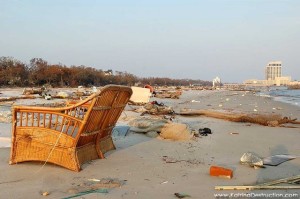It’s impossible to condense the Hurricane Katrina experience in a few short blogs let alone the 5 years that have followed. I have tried, but came to the realization that it would be several more blogs to truly give the full spectrum. In the first 3 blogs of this series I have given you a taste of my personal experience during the storm and the days that (immediately) followed along with a few bits of other survivor’s stories and some interesting facts about the storm. This has been my best effort to share it all with those of you who don’t know what it’s like first hand. Each year, I try to write something for you that helps put a face on this reality. The eye of Hurricane Katrina made landfall in my hometown. My life was forever changed. History washed away and starting over in a place that felt comparable to the aftermath of a nuclear explosion. Each year I take this journey again, but I learn a little more and I reflect a little more and I am reminded of how truly blessed I am to be here today and with little struggle compared to so many. It is also a huge part of my healing process to do these projects.-Suz 8/29/10
I re-read my closing from the series I wrote last year, and want to share it here with you today:
From “Coming out of the dark” by Suz (post date 8/30/2009):
I have spent this week focusing on facts about Hurricane Katrina in order to raise awareness for a few reasons. #1 most people were led to believe by the media that Katrina struck New Orleans, LA but that is not all together true. The media favored New Orleans because it is a famous city, but the media failed the MS Gulf Coast where Katrina truly made landfall and did far more devastation than was done in New Orleans. The actual eye of the storm landed in the very town where I live, Waveland, MS. #2 Four years have passed since Katrina made landfall and people are beginning to forget. We are still struggling to rebuild and I’m sad to report that, for the most part, things here are not much different than they were 4 years ago. Don’t get me wrong, the debris and garbage have been cleared… but the land is still barren and remains an empty shell of a town (actually a few towns) that once was great. But, I do not want to be negative here. I want to generate understanding. It is not completely illogical that the rebuilding process is moving so slowly. It is very hard to comprehend complete devastation and where to begin to rebuild an entire city (cities actually). Not only that, but how do you rebuild a city so that it’s better equipped in the event that is should ever face another disaster like this? It’s not easy. It takes time. I admit, I complain constantly about the stagnant recovery and I shouldn’t. Being a resident and eye witness I should be understanding of the very statement I just made about how hard it really is to rebuild after complete devastation, but living in the stagnation and harboring memories of what once was is not an easy task. If you want to say I have courage, then say it is for just that… living here among this when so many others have moved away. But don’t misunderstand me. I completely understand why so many (more than not) people moved away afterward… they were homeless, they were jobless, they had families to care for and they needed to proceed faster than the conditions would allow. I was more fortunate in the fact that I wasn’t rendered homeless or jobless and didn’t have a family to care for, so I stayed. I’m not a hero, I’m just a person.
I’m a person forever changed after this devastation. But a person changed for the better in ways I cannot begin to describe in a blog or a letter or in any words that even I could understand. You see, I was blessed with the ability to give to others. I was able to house others for up to two years after the storm and I was able to feed and care for others in ways that so many could not. This was humbling for me. This was awesome for me. From the moment the storm ended and the years that followed, I was able to help and it was wonderful. I guess my only mistake in that period was not taking a moment to consider my own feelings of pain because I continuously convinced myself that I didn’t deserve to feel pain since I was so much better off than the average person. The losses that I suffered were not so much material though. My friends moved away, almost all of them. My two best friends, one who lived up the road from me that I spent much time with and one I’d spent my whole life with and shared time with daily. That was a tremendous loss for me. The places that I liked to go for fun, the places that I attended school, the landmark of my first kiss, the physical locations of many milestones in my life… gone forever… that was a tremendous loss for me. But I became so absorbed in helping others in moving forward that I didn’t mourn my losses for quite some time, at least 2 years after the storm. And helping others healed me and made me a better person.
But another thing that changed my outlook was seeing the good in others. In these modern times I had come to see people as selfish and uncaring. I had grown bitter as the media continued to show horrible crimes and selfish actions of people day in and day out. Each day that passed made it harder for me to believe there was any good left in the world. Each day it seemed my heart grew colder … until Katrina. Immediately following that storm, I saw people reaching out to help one and other. I saw people from all walks of life, standing in long lines waiting for supplies… holding each other as they cried. Race did not matter. Age did not matter. Financial status did not matter. We were all one … for once. It was amazing and beautiful. Even though the circumstances were so hard, we were one. If was fantastic. People were helping each other without even asking. If one saw another struggling, they immediately helped. It was simply amazing. It was great. And then came the others. Before the government stepped in, the Christians came … from everywhere. Whether or not you are Christian, you have to respect these people who came as quickly as possible from all over the world to aid us … Living in tents just like the residents … Working round the clock to feed and clothe the people of the area and eventually working toward building homes for the homeless. The kindness and giving that poured in was another thing that truly changed my heart. As time passed, it wasn’t just Christians but several organizations of people with good hearts who came to help. Groups of people who were part of no organization at all, but just wanted to help came too. Groups of people who formed organizations just to be able to help, they came too. Again, I find myself in a position where I could write a novel just about the change of heart that occurred within me … about the kindness I saw daily … about the good that surrounded us here. But this is my last blog in the series, so I need to make some other points too.
Many of you have asked about my status today. As you have read, when Katrina struck I had just purchased a new home and still owned the old one I was in the process of moving out of/renting to a couple. I had a brand new mortgage that was costing a rather large sum on top of an old mortgage that was supposed to be paid with rent I was obviously no longer to collect (that home was completely destroyed). After struggling for 2 years as I supported the bills of 2 households (including one that no longer existed) and the financial needs of myself and anywhere from 7-4 additional residents in my home (depending on the time frame) I found myself on the brink of bankruptcy. I could not receive government aid or any favor due to the fact that on record I appeared to be financially better off than most so I was not eligible for any form of government aid. My vehicle, though it was paid for, was falling apart. I was in a bad financial state. I had to sell my only good home in order to make ends meet and just as I thought I would have to start all over again, like everyone else, God had saved one more blessing just for me. My employer had a program to rebuild the homes of all employees devastated by the storm. I had originally refused to be a part of the program due to the fact that I was so much better off than any of my fellow employees, but when my boss learned of my struggle he insisted I join the program and rebuild on my original piece of property. Today, I am in a new home thanks to that blessing. Today, I am on my feet again thanks to that blessing. I didn’t come out ahead, but I broke even … still better off than the average person here. And, I admit, I still feel somewhat guilty about that but I shudder to think where I would be today without it.
Bridge Restores a lifeline to a battered town (NY Post original date: May 29, 2007)
Sometimes a bridge is more than just a bridge. The new span across the copper-colored St. Louis Bay connects today’s diminished reality to memories of a more generous past, a hopeful link to the return of better days. And it has ended the isolation, physical and mental, of a place that once considered itself a jewel of the Gulf Coast, a sun-baked collection of picturesque old frame houses that Hurricane Katrina smashed, then severed from its brethren to the east. The surge from the storm wiped out the concrete bridge carrying U.S. Highway 90 that had stood for a half-century. The recovery is creeping along. Wind off the bay is still the loudest noise in the empty-seeming downtown, whistling through ruined buildings and banging loose siding. Before the storm Bay St. Louis was a favored seaside retreat for New Orleanians — the historian Stephen E. Ambrose had lived and written here before his death in 2002 — and, coming from the east, a genteel respite from the garishness of Biloxi’s casinos.“It’s major, psychologically,” said Alicein Chambers, who opened the Mockingbird Cafe a year after the storm. “It just feels like we’re moving, we’re making progress, we’re going forward.” Before, “we were all just on this little cut-off island,” she said; now, “we’re happy to be part of the coast again.|
The partly illusory feeling of isolation — the east-west Interstate 10, just 10 miles to the north, has been available throughout — was nonetheless pervasive. The old way of communicating with the neighbors in Pass Christian and Biloxi, first by way of the wooden bridge of the 1920s, then the concrete one of the 1950s, had been wiped out. And a seven-minute dash across the bay had turned into a 45-minute commute.“After the storm, we were an island unto ourselves,” said Brian Rushing, a minister at the First Baptist Church. “We truly have been isolated from the rest of the Gulf Coast community.”Bay St. Louis Mayor, Eddie Favre, is still living in a trailer, and the old City Hall downtown is still empty. He has moved municipal functions to a former utility company building on the highway. Downtown, on a deserted street, an injunction scrawled on a vacant frame house — “Please respect our loss. Do not enter” — seems superfluous, as there is nobody around to read it.
Mayor Favre calls the bridge a tremendous psychological and emotional boost.“For 626 days, we felt that isolation,” he said. “The bridge, in so many ways, whether it was walking or fishing, it was just so much a part of our daily life.”
Taken from “Bridging the gap” By Suz (5/17/2007):
Yesterday it finally felt better. Yesterday it finally felt like home. The Bay bridge was finally opened. I rode through my home town and felt happy for the first time since Katrina. I guess, because for the first time, I was able to see progress on our beach front. The best part of our wonderful town remained a ghost town, separated as if a deserted island without a bridge to cross the water. To get to the other half of the Gulf Coast, you would have to drive around to take the interstate, adding about 30 minutes to your ride and a good $5-$10 in additional gas!! We were severed from what we knew. Having lived here all my life, it just felt so wrong to be severed this way. I seldom even drove to the barren beach front any more that used to be my favorite place to go.
Today, for the first time, I took the bridge home from work. “Sweet Emotion” cranked on my stereo, windows down, and a smile across my face. It was a gorgeous day. The bridge, now constructed so differently, made me feel as though I was traveling to a whole new place. It felt strange … but good!
Some readers’ comments:
Neil- I know exactly how you feel Susan. When I went over the bridge on Thursday it felt like I was free again! .. These past two years have made me feel like I have been trapped on a blown up island. Although there is really nothing on the other side of the bridge till Gulfport, it gives a sense of freedom that is hard to quantify, or explain to someone that has not been living in Bay St. Louis since Katrina. The bridge does give some hope that the coast will come back.
Drew- I LOVE this blog! I will keep going back to people have NO IDEA, but seriously, people have no idea how much milestones in improvement can make such a HUGE difference. Like I remember when they put the two trailers and a deck where the yacht club used to be, and I joined all the locals there for a party and it was so nice to have some semblance of progress. So nice. Hell like the celebration of electricity. Just getting f’n electricity was a reason to be excited and have a party. ;-)Friends have a house on the bluff that survived the storm. I will never forget the first party I attended at their house. To see lights at night that were not run by a generator and a working bathroom was something most people can never understand how gratifying it can be. We grilled and drank and I sat back and quietly listened to all the stories. It was a magical night that is imprinted in my memory forever. The new bridge is so glorious. It is a tribute in a way to making things better. The effort put in by so many that have come to help the Bay rebuild is so heart warming. When I drove around early after the storm. Every time I saw a Georgia Power truck, I would roll down the window and thank them. I was so blown away by their commitment and effort to get the job done not even being from there. It is people like that that reinforce my belief in humanity. They came to a place where they were not even going to have basic human services and comforts, and stayed for months until the job was done.
Do not forget us.
We are the Mississippi Gulf Coast.
Remember our name.
We will make history again…
as the people who fought
to revive
the greatest place we’ve ever known…
Our home!-Suz 8/28/2009
Will South Mississippi be recovered in five more years?
By KAREN NELSON – klnelson@sunherald.com
State Sen. Debbie Dawkins, D-Pass Christian, and Ocean Springs architect Bruce Tolar both said progress has been slowed by a holdup in recovery money. It hasn’t flowed where it was needed, they said. Both said they might consider the Coast recovered closer to 20 years after the storm, not 10.
“Five years feels like we’ve been in quicksand,” Tolar said. “I think we’re just now starting to see things happen that we thought we would see three years ago.”
Scott King, director of policy and research at the Gulf Coast Business Council, predicts in the next few years, as the recession fades, the Coast will see an acceleration in construction, leisure and hospitality jobs that will exceed those of the nation.
“We’ve made progress in the midst of a recession and prohibitive insurance rates,” King said. “The recession will take care of itself, and when the insurance rates start to come down, there will be a real stimulus to the economy.”
He said Katrina forced the Coast to work together and gave some cities a chance to look at how they want to grow. But what the Coast will actually look like is hard to speculate, he said.
AFTERMATH – Hurricane Katrina: Five Years Later
By J.R. WELSH of The Sea Coast Echo Aug 28, 2010
Five years later, Katrina has become a bookmark in the lives of thousands. Stand in line at any store, and you’ll hear it over and over: Time is marked by the prelude “before the storm,” or “after the storm.”
Historic homes were left in rubble, businesses were ruined, dreams were shattered. And in the ensuing five years, crime has risen, people who managed to survive the storm have died from Katrina-induced stress or illness, marriages have come apart at the seams.
Jim Thriffiley, a retired educator who served 30-plus years on the Bay St. Louis City Council, has been quietly keeping tabs on Katrina recovery. While the area has sparkling new government buildings and roads rebuilt with federal money, he thinks the progress glimmers on the surface but hasn’t really improved things for ordinary people. Five years later, he said, Katrina’s largest legacy is a lack of prosperity.
“A lot of the people who are under 45 – maybe 50 to 75 percent of those people – don’t have a permanent job where they can work 40 hours a week,” he said. “I see a lot of people who are discouraged.”
With city revenues falling, the loss of the vacation home economy, and a precipitous decrease in population since the storm, Thriffiley fears the area is returning to the low economic tides that flowed here in 1965, when Hurricane Betsy struck Louisiana.
Homesick in my home town
gazing out the window
I pull the blinds down
I mourn for you
more with each day that passes
I wish I could see you through rose colored glasses
I took you for granted
your beauty, your history, your imagery
vanished
I’m lost without you
though I seem to find my way
your landmarks and milestones have all washed away
I’m homesick and broken hearted
ever since the day we parted-Suz 7-29-10



